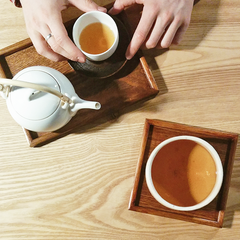To Decaf or Not to Decaf?
How much caffeine is in tea compared to coffee?
Caffeine naturally occurs within the tea leaf in order to nourish growth and protect its buds from pesky insects. The amount of caffeine in tea leaves varies and is dependent on many different factors including the type of tea, its origin and how you brew it. As a rule of thumb, most research agrees that a cup of tea contains around half as much caffeine as in a cup of coffee. Don’t forget, when we talk about caffeine in tea, we are referring to Black, Green and White teas only, as Rooibos and Herbal teas are naturally caffeine free.
Is too much caffeine bad for me?
Caffeine is considered safe if consumed in moderation, however consuming too much caffeine has been linked to higher blood pressure, insomnia and panic attacks in some people. A report conducted by the European Food Safety Authority found that 400mg of caffeine a day, in healthy adults, has no health consequences. So for you and me, this equates to around 4-5 cups of coffee or 8-10 cups of tea per day.
What does the caffeine in tea do to the body?
Caffeine stimulates the central nervous system and the cardiovascular system, and as you may well have experienced first hand, it is said to improve mental focus and suppresses tiredness. From the body’s perspective, however, the caffeine in tea works very differently to the caffeine in coffee. Let me explain... along with caffeine, tea also contains polyphenols (which are great for you by the way) and when consumed, these polyphenols bind to the caffeine, meaning it gets released over a longer period of time. Tea is therefore said to have less negative side effects and be better than coffee for prolonged concentration and alertness.
What caffeine free teas to choose?
If you want to cut down on your caffeine intake you have a few options. Why not step out of that comfort zone and try some different Rooibos and Herbal/Fruit teas, which are naturally caffeine free. Rooibos in particular has a great bold flavour and goes well with a splash of milk so it’s more similar to regular Black tea.
What about decaffeinated tea?
Decaffeinating tea often lessens the flavour, but if you do prefer to drink decaffeinated tea just be sure to check the way in which the caffeine is removed. There are a few methods commonly used to decaffeinate tea, look for the CO2 (carbon dioxide) method, which is the most natural. Other processes including the ‘ethyl acetate’ and the ‘methylene chloride’ method have been found to leave residual chemicals on the leaves and have been said to reduce the antioxidant levels.
Consuming a normal amount of caffeine each day may work well for you, and when drunk in tea you get the added benefits of antioxidants. However if you are looking to cut down on caffeine, try replacing that extra coffee or tea with a Rooibos or Herbal blend. You never know, you may just find a new tea you love!
Leave a comment
Comments will be approved before showing up.
Also in Born Wild Tea Talk
Wimbledon Strawberries & Cream Iced Tea
Wimbledon is well under way this week and we all know what that means... strawberries and cream everything! So, we've created a delicious strawberries and cream iced tea latte to share with you guys using our 'Chocolate Strawberries' tea blend.
A brief (ish) history of tea
Tea as we know it has come a long way to get to where it is today. We are talking all the way from ancient China, where legend has it that tea was discovered by accident!
Our Tea Tourist Adventure
At the start of this year we teamed up with Tea Tourist, a wonderful loose leaf tea subscription service, to feature one of our unique tea blends within their January discovery box.



